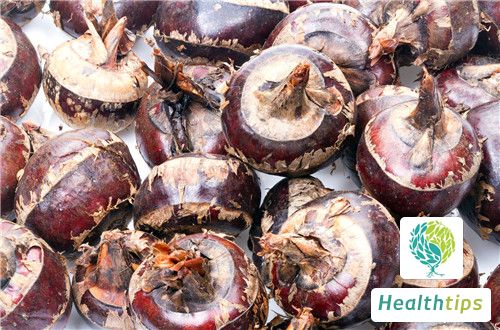Water chestnut seedlings enter the lung, stomach, and three meridians, which have the effect of nourishing the lung, cooling the liver, clearing the heart, and purging fire. They also have the effect of diuresis, clearing eyes, and digesting food and resolving phlegm. Water chestnut seedlings, also known as Tongtian grass, can play a good role in clearing heat and detoxifying, and can play a good therapeutic role in respiratory diseases and urinary system inflammation. Due to its effect of promoting saliva and quenching thirst, it can also be used as an adjunctive treatment for diabetes. 1. Treat respiratory diseases. During the spring and autumn seasons when there are more respiratory infectious diseases, eating fresh water chestnuts is beneficial for preventing and treating epidemic meningitis, measles, pertussis, and acute pharyngitis. 2. Bowel-regulating, laxative, diuretic, and lymphatic-promoting effects. Water chestnuts contain crude protein and starch, which can promote bowel movement. Clinically, they are often used to treat food stagnation and constipation caused by heat evil. The decoction of water chestnuts can promote diuresis and discharge lymph, making it an excellent diet for patients with urinary tract infections. 3. Adjunctive treatment of diabetes. Water chestnuts are tender and juicy, which can promote saliva and quench thirst, and have a certain adjunctive therapeutic effect on diabetic patients. 4. Clearing the lungs and resolving phlegm. Water chestnuts have a sweet and cold nature, which can clear lung heat and are rich in mucilage, which has the effect of promoting saliva, nourishing the lungs, and resolving phlegm. Therefore, they can clear and resolve phlegm heat, treat lung heat cough, cough up yellow sticky sputum, and other symptoms. 5. Functional uterine bleeding. Functional uterine bleeding often manifests as menstrual disorders and abnormal uterine bleeding. Ovulatory dysfunctional uterine bleeding is common in women of childbearing age, while anovulatory dysfunctional uterine bleeding is more common in adolescents or postmenopausal women. Practice has shown that the use of water chestnuts and shepherd's purse for medicinal meals has a good therapeutic effect on female functional uterine bleeding.


